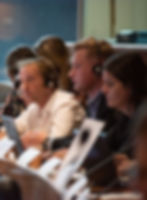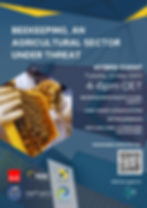Hybrid Event-Summary: Beekeeping, an agricultural sector under threat
- May 31, 2023
- 5 min read
Updated: Sep 20, 2023

On the 23rd of May, a conference about the beekeeping sector, “Beekeeping: an agricultural sector under threat”, was hosted by MEPs Juozas Olekas (S&D, Lithuania) and Franc Bogovič (EPP, Slovenia) on the occasion of the World Bee Day celebrated on the 20th of May. This hybrid event occurred during a busy week in the political arena, with key legislative texts discussed (Sustainable Use of Pesticides Regulation) and voted on (Natural Restoration Law). These two pieces of legislation are key to protecting bees and pollinators, reversing their decline and, therefore, ensuring the sustainability of the beekeeping sector and the health of their colonies. Still, no one should forget the beekeeping sector as it is one of the bases of our agricultural food systems through the pollination services provided to other farming sectors and the support to biodiversity. In total, around 300 participants were registered across Europe.
For several years the beekeeping sector has been under threat. Not only have beekeepers been experiencing unsustainable colony losses for more than twenty years due to environmental threats, but climate change has also contributed to radically decreased production. Consumers and society have not realised these phenomena in bee products because affordable or cheap honey has been permanently on the supermarket shelf. The main importers to the European market, Ukraine and China, have steadily supplied the demands European beekeepers could not fulfil (40% of the European market). The latest EU Coordinated action, “From the hives” (March 2023) in Europe, revealed that 46% of the imported honey was suspected of not being honey.

Already 5 years ago, the Erdos report pointed out the worrying situation and gave recommendations, including full transparency on the labelling of the origins of the blended honey. Consumers have the right to know where their honey comes from, and the current Directive allows labelling which just states a “blend of EU and non-EU countries”, similar to saying that the honey comes from Earth. The European beekeepers cannot deal anymore with unfair competition in the international market, pushing down the prices to an unrealistic level via the commercialisation of doubtful products. Etienne Bruneau, vice-chair of Copa-Cogeca WP on honey, showed the dramatism of the market situation of these producers and the reasons behind it (i.e., sanitary issues, environmental degradation, climate change and the war and energy issues).
Published in April 2023, the European Commission’s proposal to revise the so-called Honey Directive proposed to end this opacity regarding the origin. Pierre Bascou, Deputy-Director-General at DG AGRI in charge of the Honey sector, presented the different tools to support the beekeepers and the new text, which is now discussed at the Council level, but also negotiated within the Parliament.
Ghislain Maréchal from DG SANTE presented the methodology and the results of the coordinated action “From the hives”, confirming that Chinese and Turkish honey present a high level of suspicion for counterfeiting. The Commission will soon provide more information about the importers involved. Lourdes Alvarellos presented the advances the Joint Research Center (JRC) has made in methodological development for fraud detection.
Feedback from the Field
François Peyrac, representative of Naturalim-FranceMiel and member of "Les Compagnons du miel", the largest beekeeping cooperative in France, has declared that transparency and complete/full traceability are possible for a honey packer, from the drum (that is to say, from the beekeeper) to the jar in the supermarkets’ shelves.

Ingrid Schmaranzer, Austrian professional beekeeping organisation (ÖEIB) and representative of EPBA, expressed herself with emotion about the dramatic and unsustainable situation beekeepers are living in. Beekeepers are taking legal action in Austria, suing retailers for wrong advertising, and negotiating the withdrawal from shelves of products whose they had demonstrated a non-conformity. It is important to say that authorities should have made these controls. As Lasse Hellander (BeeLife president) said, “the burden of proof should not lay on the beekeepers.”
Kestutis Garalevicius, a Lithuanian young beekeeper, expressed his frustration and desperation with the situation: “Young farmers or beekeepers do not go into a non-profitable business. High production costs, colony losses, reduced production and extremely low prices if we manage to produce. Who would like to create a future life under these conditions?”
“We are all talking about sustainability, but we just heard from our young colleague in Lithuania that the unfair competition is clothing down beekeepers. Fewer beekeepers also means less pollination and this might mean that farmers are producing less on each hectare. I am just saying this because this issue is also very much about sustainability in agriculture.” said from the audience Rune Havgaard Sorenson, Danish beekeepers association. He is right, and when consumers buy honey from Europe, they buy more than honey. The European beekeeping sector supports Europe's biodiversity and long-term food security through bee crop pollination, and beekeepers are fundamental stewards of the environment.
The solutions
A message repeated over the event was a request for strong support of beekeepers to the European Commission, administration and politicians, now and for future generations.
European beekeepers voiced by Copa-Cogeca are calling for strengthening controls and the human and financial resources allocated to the fight against fraud in Europe and for respect for their work through fair remuneration for the hive's products. Recently they launched the EU campaign #HoneYstLabellingNow! To raise awareness about the problem.

All the stakeholders agreed on the importance of the methods to detect fraud. An effort must be made to work together, to standardise the new methodologies. The JRC made a call for more cooperation between stakeholders.
Concerning the labelling, the position of beekeepers is just as clear: complete transparency with the list of countries of origin written in an identifiable way in descending order of weight, with the respective percentages indicated, and complete traceability, from the barrel (and therefore from the beekeeper) to the jar sold on the supermarkets’ shelves. Consumers, represented by Ingrid Kragl from Foodwatch, fully support the views and demands of European beekeepers (video).
This proposal was supported by the MEPs present, Juozas Olekas (S&D), Irène Tolleret (Renew) and Franc Bogovič (PPE), who clearly expressed their views on the subject, but was rejected by the Commission and one of the main packers in the European honey market.
The modification of the Honey directive will be negotiated between the Member States, the European Commission and the Parliament during the Spanish presidency (July-December 2023). We hope authorities will not let die this small sector that is a ground pillar of food security in Europe and a sentinel of the quality of our environment.
----- ENDS ----
Contact: Noa SIMON DELSO, BeeLife European Beekeeping Coordination, comms@bee-life.eu
The organisation of the event counted on the support of the EP Intergroup on Climate
Change, Biodiversity and Sustainable Development and the project B-THENET, a European project supporting the beekeeping sector, good practices in the related sectors and promoting the interactions between stakeholders to foster sustainable beekeeping.
Read more about BeeLife's communication on this topic here
















